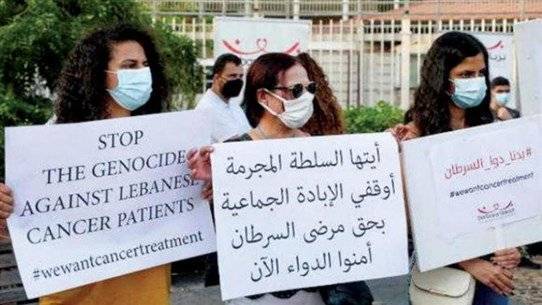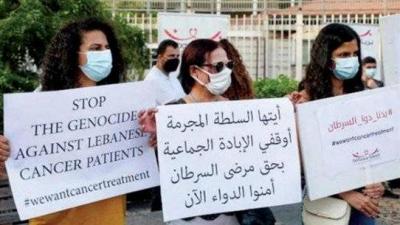Cancer patients in Lebanon continue to face not only the struggle against their illness but also the challenge of securing their missing medications as imported quantities have diminished due to a decrease in funds allocated by the Central Bank of Lebanon for purchasing these drugs. The bank previously supported these medications with $115 million before the financial crisis, but this amount has since dropped to around $35 million, distributed among cancer drugs, other chronic diseases, and medical supplies. As a result, hundreds of patients have either gone without their medications or received insufficient dosages, leading to many deaths over the past three years.
Health Minister in the caretaker government, Firas Al-Abyad, announced after meeting with Prime Minister-designate Najib Mikati on Thursday that they had agreed to release financing for the next three months, with an increase of $5 million monthly, specifically for cancer and chronic disease medications. Al-Abyad also discussed plans to automate the medication distribution process, which he believes will ensure better control and reduce instances of corruption, theft, or misuse.
Hani Nassar, head of the "Barbara Nassar" Association supporting cancer patients, who is working with the Health Ministry on automation, indicated that Minister Al-Abyad anticipates this issue could be resolved by next September. He noted that the new system, which provides each patient with an electronic identity, is aimed at minimizing waste and smuggling.
Nassar remarked that the allocation of an additional $5 million, with the condition that it is fully earmarked for cancer medications, would alleviate the suffering of many patients who struggle to obtain their medications, noting that 80% of them live below the poverty line and rely on drugs provided by the Health Ministry. He warned about the rising problem of counterfeit cancer drugs in the Lebanese market, as patients unable to find legitimate medications resort to importing them from abroad, particularly Turkey, often ending up with fake products that do not provide the necessary treatment.
Ralph Matar, the husband of Alfer Maqbel, who is suffering from lung cancer, manages to procure her medication from Russia. He told "Asharq Al-Awsat" that he has spent between 500 and 600 million Lebanese pounds (approximately $16,000 to $19,000) for her treatment over the past five months, asserting that seeking help from the Health Ministry has proven fruitless in light of the acute medication scarcity. He stated, "I pay $200 for the medication from Russia; if it were available in Lebanon, I wouldn't pay more than $22 for it."
Alfer's family, like many others, awaits the necessary assistance to continue providing treatment to their loved ones. Prime Minister Najib Mikati had previously informed cancer patients on the occasion of "World Cancer Prevention Day" on February 5 that the state would not be able to keep providing the required funds to support their medications, saying, "I must candidly tell you that the state can no longer bear this burden in the coming period due to increasing needs and limited resources. Therefore, we are appealing today to everyone—officials, the private sector, local civil society, and international organizations and donor countries—to extend their hand to help us during this critical time, as patients cannot wait for the budget to be approved or a recovery plan to be formulated."
In light of the ongoing crisis, the Health Minister announced that an investigation committee he formed a few days ago, consisting of an administrative inspector and several officials from the pharmacy inspection department, the medical committee for cancer medications, and the information department at the Ministry of Public Health, "is continuing to review the information circulated via the media regarding the loss of cancer medications shortly after their delivery to the Ministry's warehouses." He noted that the committee will conduct audits and investigations with all parties involved over the next two weeks to confirm any violations and determine responsibilities if found.
Al-Abyad stressed that the ministry takes this issue very seriously, stating that if any legal violations or breaches of medical, humanitarian, and ethical commitments are revealed, the case will be referred to the public prosecution for appropriate action.
He stated that "what the drug issue has experienced since the onset of the financial crisis underscores the validity of what the Ministry of Public Health is striving for—a strategic change in drug tracking and monitoring through modern automated programs and systems, starting with assigning a health number for the patient to allow for medical file auditing alongside tracking the drug's movement from the moment it arrives in Lebanon until it is delivered to the patient or the treating hospital."




